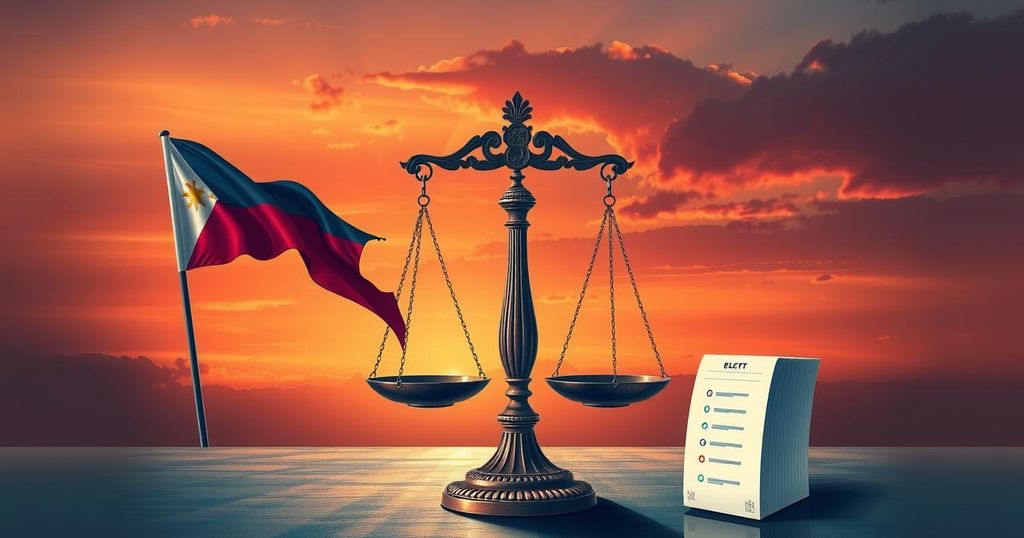World news
ASIA, BENARNEWS, CORRUPTION, CRIMINAL COURT, DAVAO CITY, DEMOCRACY, ELECTION, EUROPE, FERDINAND MARCOS JR, FRANCO, GOVERNANCE, HAGUE, ICC, INTERNATIONAL CRIMINAL, INTERNATIONAL CRIMINAL COURT, JEAN FRANCO, MANILA, MARCOS, NETHERLANDS, PHILIPPINES, PRESIDENTIAL ELECTIONS, RODRIGO DUTERTE, SENATE, THE HAGUE, UNIVERSITY OF THE PHILIPPINES
Elena Martinez
0 Comments
Duterte’s Arrest Heightens Political Stakes for May Midterm Elections
The arrest of former Philippine President Rodrigo Duterte on ICC charges has intensified the political atmosphere ahead of the May midterm elections in the Philippines. Analysts predict heightened rivalry between the Duterte and Marcos families amid ongoing campaigns. With Vice President Sara Duterte facing impeachment, the outcome of the elections and future political landscape remains uncertain, as candidates weigh public sentiment and strategic responses to these developments.
The arrest of former Philippine President Rodrigo Duterte on a world court warrant for alleged crimes against humanity has heightened the stakes for the upcoming midterm elections set for May. As the elections approach, Duterte’s transfer to the International Criminal Court on March 11 coincides with significant political turbulence, including the recent impeachment of Vice President Sara Duterte by Philippine lawmakers.
The May midterm elections were already anticipated as a contest between two dominant political families: the Dutertes and the Marcoses. Duterte’s arrest has escalated tensions within this rivalry, once marked by alliances, now fraught with conflict. Political analysts suggest that the Marcos camp may intensify its efforts to diminish the Duterte influence, fearing retaliation following Duterte’s arrest.
Political science expert Jean Franco indicates that the Marcos administration holds a resource advantage for the elections, even as the Dutertes campaign vigorously within their Davao City stronghold. Rodrigo Duterte aims to reclaim the mayoral position, while his family members pursue various local government positions, indicating their ongoing political ambitions.
Nationally, President Ferdinand Marcos Jr. is supporting twelve senatorial candidates, while several Duterte allies seek Senate positions amid the vice president’s impeachment trial, set to begin in July. The allegations against Sara Duterte range from constitutional violations to plotting potential violence against President Marcos.
Political analysts have noted the potential for significant disruptions, including the risk of uprisings by Duterte supporters against the Marcos administration, should tensions escalate. Reports of unity within military ranks following Duterte’s arrest suggest that while there may be unrest, the military remains cohesive. The Philippine National Police has also escalated security nationwide.
Recent surveys show that some of Duterte’s closest allies, such as Senator Christopher “Bong” Go, remain among the most favored candidates for reelection. However, with two prominent figures implicated in the International Criminal Court case—Senator Ronald “Bato” Dela Rosa, known for his enforcement of the drug war—there are rising concerns among candidates about their safety and political future.
As candidates assess the implications of Duterte’s arrest, many remain hesitant to take firm stances, awaiting public reactions to developments. Political analysts emphasize that a crucial moment will arise with any decisive actions related to Dela Rosa’s status, which may influence broader candidate sentiments.
Although previous surveys indicate a significant approval rate for investigations into Duterte’s drug war, public sentiment towards his arrest remains uncertain, as new polls have yet to gauge voter opinions. The potential ramifications for Sara Duterte’s political career in 2028 also pose risks, with her upcoming impeachment trial and the implications of her father’s legal troubles looming large.
The political landscape could shift rapidly in the coming months and years, with significant ramifications for both the Dutertes and the Marcoses as they navigate the charged atmosphere leading into the elections.
In conclusion, the arrest of Rodrigo Duterte has amplified the political stakes ahead of the May midterm elections in the Philippines. The contest appears increasingly polarized between the Duterte and Marcos factions, with implications extending to the vice presidency and beyond. As political dynamics evolve, candidates are cautiously positioning themselves in response to public sentiment towards Duterte’s ICC case and the unfolding electoral landscape. The potential for unrest and strategic maneuvering points to a complex and unpredictable political environment in the lead-up to the elections.
Original Source: www.benarnews.org




Post Comment